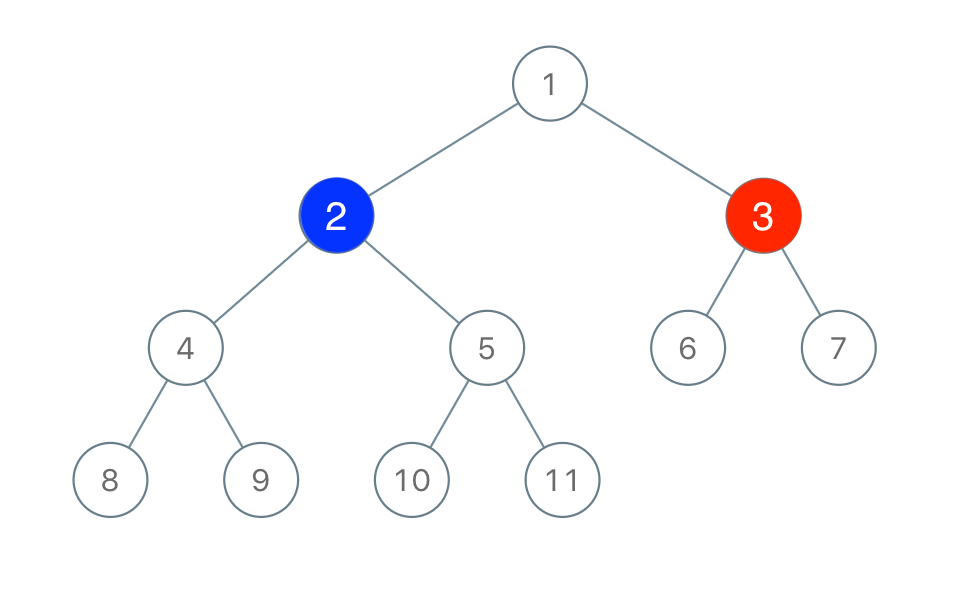有两位极客玩家参与了一场「二叉树着色」的游戏。游戏中,给出二叉树的根节点 root,树上总共有 n 个节点,且 n 为奇数,其中每个节点上的值从 1 到 n 各不相同。
最开始时:
- 「一号」玩家从
[1, n]中取一个值x(1 <= x <= n); - 「二号」玩家也从
[1, n]中取一个值y(1 <= y <= n)且y != x。
「一号」玩家给值为 x 的节点染上红色,而「二号」玩家给值为 y 的节点染上蓝色。
之后两位玩家轮流进行操作,「一号」玩家先手。每一回合,玩家选择一个被他染过色的节点,将所选节点一个 未着色 的邻节点(即左右子节点、或父节点)进行染色(「一号」玩家染红色,「二号」玩家染蓝色)。
如果(且仅在此种情况下)当前玩家无法找到这样的节点来染色时,其回合就会被跳过。
若两个玩家都没有可以染色的节点时,游戏结束。着色节点最多的那位玩家获得胜利 ✌️。
现在,假设你是「二号」玩家,根据所给出的输入,假如存在一个 y 值可以确保你赢得这场游戏,则返回 true ;若无法获胜,就请返回 false 。
示例 1 :
输入:root = [1,2,3,4,5,6,7,8,9,10,11], n = 11, x = 3 输出:true 解释:第二个玩家可以选择值为 2 的节点。
示例 2 :
输入:root = [1,2,3], n = 3, x = 1 输出:false
提示:
- 树中节点数目为
n 1 <= x <= n <= 100n是奇数1 <= Node.val <= n- 树中所有值 互不相同
方法一:DFS
我们先通过
接下来,我们统计
时间复杂度
# Definition for a binary tree node.
# class TreeNode:
# def __init__(self, val=0, left=None, right=None):
# self.val = val
# self.left = left
# self.right = right
class Solution:
def btreeGameWinningMove(self, root: Optional[TreeNode], n: int, x: int) -> bool:
def dfs(root):
if root is None or root.val == x:
return root
return dfs(root.left) or dfs(root.right)
def count(root):
if root is None:
return 0
return 1 + count(root.left) + count(root.right)
node = dfs(root)
l, r = count(node.left), count(node.right)
return max(l, r, n - l - r - 1) > n // 2/**
* Definition for a binary tree node.
* public class TreeNode {
* int val;
* TreeNode left;
* TreeNode right;
* TreeNode() {}
* TreeNode(int val) { this.val = val; }
* TreeNode(int val, TreeNode left, TreeNode right) {
* this.val = val;
* this.left = left;
* this.right = right;
* }
* }
*/
class Solution {
public boolean btreeGameWinningMove(TreeNode root, int n, int x) {
TreeNode node = dfs(root, x);
int l = count(node.left);
int r = count(node.right);
return Math.max(Math.max(l, r), n - l - r - 1) > n / 2;
}
private TreeNode dfs(TreeNode root, int x) {
if (root == null || root.val == x) {
return root;
}
TreeNode node = dfs(root.left, x);
return node == null ? dfs(root.right, x) : node;
}
private int count(TreeNode root) {
if (root == null) {
return 0;
}
return 1 + count(root.left) + count(root.right);
}
}/**
* Definition for a binary tree node.
* struct TreeNode {
* int val;
* TreeNode *left;
* TreeNode *right;
* TreeNode() : val(0), left(nullptr), right(nullptr) {}
* TreeNode(int x) : val(x), left(nullptr), right(nullptr) {}
* TreeNode(int x, TreeNode *left, TreeNode *right) : val(x), left(left), right(right) {}
* };
*/
class Solution {
public:
bool btreeGameWinningMove(TreeNode* root, int n, int x) {
auto node = dfs(root, x);
int l = count(node->left), r = count(node->right);
return max({l, r, n - l - r - 1}) > n / 2;
}
TreeNode* dfs(TreeNode* root, int x) {
if (!root || root->val == x) {
return root;
}
auto node = dfs(root->left, x);
return node ? node : dfs(root->right, x);
}
int count(TreeNode* root) {
if (!root) {
return 0;
}
return 1 + count(root->left) + count(root->right);
}
};/**
* Definition for a binary tree node.
* type TreeNode struct {
* Val int
* Left *TreeNode
* Right *TreeNode
* }
*/
func btreeGameWinningMove(root *TreeNode, n int, x int) bool {
var dfs func(*TreeNode) *TreeNode
dfs = func(root *TreeNode) *TreeNode {
if root == nil || root.Val == x {
return root
}
node := dfs(root.Left)
if node != nil {
return node
}
return dfs(root.Right)
}
var count func(*TreeNode) int
count = func(root *TreeNode) int {
if root == nil {
return 0
}
return 1 + count(root.Left) + count(root.Right)
}
node := dfs(root)
l, r := count(node.Left), count(node.Right)
return max(max(l, r), n-l-r-1) > n/2
}
func max(a, b int) int {
if a > b {
return a
}
return b
}/**
* Definition for a binary tree node.
* function TreeNode(val, left, right) {
* this.val = (val===undefined ? 0 : val)
* this.left = (left===undefined ? null : left)
* this.right = (right===undefined ? null : right)
* }
*/
/**
* @param {TreeNode} root
* @param {number} n
* @param {number} x
* @return {boolean}
*/
var btreeGameWinningMove = function (root, n, x) {
const dfs = root => {
if (!root || root.val === x) {
return root;
}
return dfs(root.left) || dfs(root.right);
};
const count = root => {
if (!root) {
return 0;
}
return 1 + count(root.left) + count(root.right);
};
const node = dfs(root);
const l = count(node.left);
const r = count(node.right);
return Math.max(l, r, n - l - r - 1) > n / 2;
};/**
* Definition for a binary tree node.
* class TreeNode {
* val: number
* left: TreeNode | null
* right: TreeNode | null
* constructor(val?: number, left?: TreeNode | null, right?: TreeNode | null) {
* this.val = (val===undefined ? 0 : val)
* this.left = (left===undefined ? null : left)
* this.right = (right===undefined ? null : right)
* }
* }
*/
function btreeGameWinningMove(
root: TreeNode | null,
n: number,
x: number,
): boolean {
const dfs = (root: TreeNode | null): TreeNode | null => {
if (!root || root.val === x) {
return root;
}
return dfs(root.left) || dfs(root.right);
};
const count = (root: TreeNode | null): number => {
if (!root) {
return 0;
}
return 1 + count(root.left) + count(root.right);
};
const node = dfs(root);
const l = count(node.left);
const r = count(node.right);
return Math.max(l, r, n - l - r - 1) > n / 2;
}
